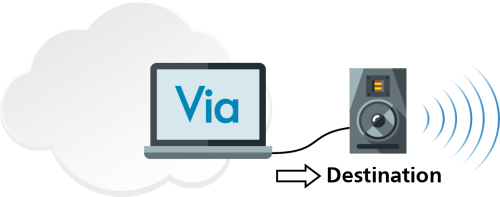Sources and Destinations
What is a ‘source’?
In Dante Via, a source is any hardware device or software application that can add audio to the computer / network system.
Sources can be physically in the computer, connected to the computer, or connected to the Dante network.
Hardware sources (devices) include:
- Internal (built-in) soundcards
- External (e.g. USB or FireWire) soundcards
- Internal and external microphones
- USB headsets
- Video cameras with built-in microphones
- Dante audio devices (such as mixing consoles)
- Hardware synthesizers, and other electronic instruments
- Any Dante Via-installed computers on the Dante network
- ‘System audio’ (the internal audio mix that the computer would usually play to the speakers)
Software sources (applications) include:
- iTunes®
- Skype®
- Digital Audio Workstations (Cubase®, Pro Tools®, GarageBand® etc.)
- Media players (VLC®, Spotify®)
- Web browsers
- Any other software applications that produce audio (such as games, PowerPoint®, email clients etc.)
Devices and applications that can add audio to the system and receive audio from the system are both sources and receivers, so they appear in both lists.
Q: Why is a microphone a ‘source’ and not a ‘destination’?
A: Microphones receive audio from the physical environment, but not from the computer / network system; they add audio to the system, which is why they are sources.

What is a ‘destination’?
In Dante Via, a destination is any hardware device or software application that can receive audio from the computer / network system.
Destinations can be physically in the computer, connected to the computer, or connected to the Dante network.
Hardware destinations (devices) include:
- Loudspeakers
- Internal (built-in) soundcards
- External (e.g. USB or FireWire) soundcards
- Computer monitors with built-in speakers
- USB headsets
- Dante audio devices (such as mixing consoles)
- Any Dante Via-installed computers on the Dante network
Software destinations (applications) include:
- Digital Audio Workstations (Cubase, Pro Tools, GarageBand etc.)
- Other audio recording applications
- Skype
Devices and applications that can receive audio from the system and add audio to the system are both destinations and sources, so they appear in both lists.
Q: Why is a loudspeaker a ‘destination’ and not a ‘source’?
A: Loudspeakers add audio to the physical environment, but not to the computer / network system; they receive audio from the system, which is why they are destinations.
